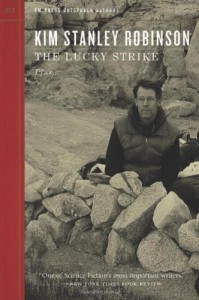 Picked this up on a whim at the library today (4/6/12). Lord knows I have enough on the TBR shelf but it's short and looks intriguing.
Picked this up on a whim at the library today (4/6/12). Lord knows I have enough on the TBR shelf but it's short and looks intriguing.____________________________________
The only other Kim Stanley Robinson work that I’ve read is The Years of Rice and Salt and while I liked it well enough, I have to say that it captured my brain but not my heart.
And the same is true with the novella included here (“The Lucky Strike”) and why I don’t have any strong desire to read much else by this author (even if he is friends with Ursula K. Le Guin). The problem in my case is that the idea of the alternate history* overwhelms an interesting story or character(s). I remember reading TYORAS and being interested in the implications of a far more lethal plague virus that wiped Western Christendom off the map but there was no story nor were there any memorable characters (the only scenes I remember – and then only in the vaguest terms – are the opening one, where a nomad from Central Asia scouts in a deserted Europe, and an episode where a Chinese mandarin is experimenting with the pyrethrins found in chrysanthemums).
The same is true here: The idea that a bombardier with a conscience (against orders) drops the A-bomb on an (largely) uninhabited region of Japan just outside of Hiroshima and the fallout (couldn’t resist, sorry) from that simple action is intriguing and well thought out here. But there’s no engagement with the characters. When I was 15, the idea would have been enough but now I need more.
More interesting is the nonfiction essay, “A Sensitive Dependence on Initial Conditions,” which explores how random and/or (apparently) irrelevant factors have enormous implications (e.g., Robinson spins out the events from the novella to construct a scenario where the Suez Canal crisis of 1956 leads to WW III). And entertains the notion that, even if we could go back in time and alter events, the end result (our present) wouldn’t look all that much different.
The final two sections of the book are an interview with Robinson and a bibliography of his writings.
I liked the ideas Robinson raises in the essay but I’m not a fan of his writing, and I can only recommend the novella to his fans.
* In contrast, look at Meljean Brook's Iron Seas books, where the idea of the alternate history takes a backseat to the story and the characters, or the quintessential alternate history, Philip K. Dick's The Man in the High Castle.


